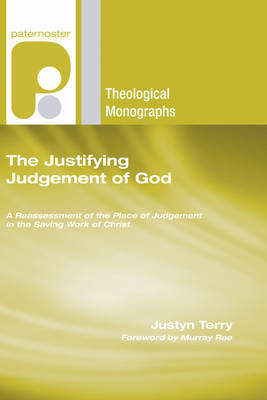
En raison d'une grêve chez bpost, votre commande pourrait être retardée. Vous avez besoin d’un livre rapidement ? Nos magasins vous accueillent à bras ouverts !
- Retrait gratuit dans votre magasin Club
- 7.000.000 titres dans notre catalogue
- Payer en toute sécurité
- Toujours un magasin près de chez vous
En raison de la grêve chez bpost, votre commande pourrait être retardée. Vous avez besoin d’un livre rapidement ? Nos magasins vous accueillent à bras ouverts !
- Retrait gratuit dans votre magasin Club
- 7.000.0000 titres dans notre catalogue
- Payer en toute sécurité
- Toujours un magasin près de chez vous
Description
This monograph argues that the doctrine of atonement may be presented more coherently by recognizing judgement as the principle metaphor of the reconciling work of Christ. Judgement, understood not only as condemnation but as the whole process of bringing about justice, provides the pattern to which victory, redemption, and sacrifice may be compared and to which they should be related. The first section is a study of twentieth-century British atonement theology to understand the assumptions that give rise to the difficulties in proclaiming the atonement. The second section examines Karl Barth's account of reconciliation in terms of the judgement of Jesus Christ, and its relationship to victory, redemption, and sacrifice. The proposal is made that judgement is the paradigmatic metaphor of the doctrine of atonement. The implications of this claim are then considered for the response to the work of Christ, and how repentance, baptism, Eucharist, and holiness are related to judgement. ""In dialogue with major twentieth-century writers on atonement Justyn Terry develops a biblically-based, rich, and coherent synthesis of models and metaphors for Christ's death and also explores our proper response. A valuable resource for academic theologians and all those committed to preaching Christ and him crucified."" --Andrew Goddard, Tutor in Christian Ethics, Wycliffe Hall, Oxford University ""Justyn Terry offers well-documented and persuasive evidence that judgement is the paradigmatic metaphor and coordinating principle for a truly biblical understanding of the atonement. Here is theology in the service of proclamation, in a book which will challenge pastors and preachers to a more urgent and coherent presentation of the essential message of the Cross, in the light of God's eternal character and purposes."" --David Jackman, President of the Proclamation Trust and Founder/Director of the Cornhill Training Course ""In arguing that the judgement of God is the central concept of the atonement that brings coherence to the metaphors of the cross as victory, redemption, and sacrifice, Justyn Terry shows himself gloriously free from the pressures of popular fashion and more concerned about presenting a valid and biblical gospel for today. Written with preachers in focus, this book is carefully researched, robustly argued, and clearly written. This is a significant book about the most significant subject of all."" --Derek Tidball, Principal, London School of Theology ""Drawing initially on Karl Barth's coordination of victory, redemption, and sacrifice as paradigms of atonement that are subordinate to the paradigm of judgement, Terry goes a long way toward restoring the sharp edge of New Testament teaching both to academic theology and to public preaching. Not only is Dr. Terry's contribution a needed new anchoring, within systematic theology, of old and more recently avoided metaphors of Good Friday, but it constitutes a turning of the page, for the wider Christian community, to a fresh chapter of existentially engaged preaching and teaching."" --Paul F. M. Zahl, Dean/President, Trinity Episcopal School of Ministry, PA Justyn Terry taught physics and then worked in the electronics industry before training for ordination at Cranmer Hall, Durham. After a spell in St. John's Hyde Park he became vicar of St. Helen's Church, North Kensington, London. He now teaches at the Trinity Episcopal School for Ministry, Ambridge, PA.
Spécifications
Parties prenantes
- Auteur(s) :
- Editeur:
Contenu
- Nombre de pages :
- 262
- Langue:
- Anglais
- Collection :
Caractéristiques
- EAN:
- 9781556356629
- Date de parution :
- 01-02-08
- Format:
- Livre broché
- Format numérique:
- Trade paperback (VS)
- Dimensions :
- 152 mm x 228 mm
- Poids :
- 376 g

Les avis
Nous publions uniquement les avis qui respectent les conditions requises. Consultez nos conditions pour les avis.






